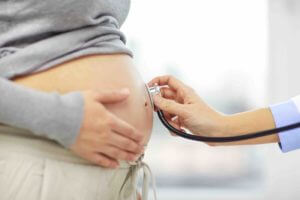Table of contents
Complaint-Free In The First Trimester – Tips For Unclouded Anticipation
In the first twelve weeks of pregnancy – the time of hormonal change – a woman’s body works at full speed for the growing life. However, more than half of all expectant mothers are affected by the change in hormone levels.
These Rhings Can Help:
For Breast Tenderness
Even before their period stops, many women notice another sign that may herald pregnancy: The breasts are particularly sensitive to touch and pain, tighten and feel large and firm. This is caused by the pregnancy hormones, which stimulate the previously dormant mammary glands to grow and already prepare them for breastfeeding. Alternating cold and warm showers or carefully cooling the breasts can relieve the pain of tension.
For Nausea Co
Between the fifth and eighth week of pregnancy, many expectant mothers complain of slight nausea or even vomiting. On the one hand, this is triggered by hormonal changes. On the other hand, the psyche also plays a role. After all, the woman is bombarded with many questions: What is in store for me, will I be a good mother…? Acupuncture helps many pregnant women. Midwives or doctors with special training can perform the treatment. Homeopathy can also suppress nausea – but since every woman reacts individually, your best friend’s remedy won’t necessarily help you. Seek advice from a homeopath. Another tip is smelling bottles with essential oils. Pregnant women usually prefer fresh scents such as lemon, mint, or bergamot. The first breakfast in bed before getting up has also proved its worth: A rusk or cookie, a glass of milk or tea raises the blood sugar level and dispels the queasy feeling in the empty stomach. Eating several small portions throughout the day instead of three large meals also curbs nausea.
For Circulation Problems
A morning snack in bed is also recommended for circulation problems and dizziness. Moreover, you should slowly and gently get your circulation going in the morning: Do gymnastics while lying down before getting up, such as circling your feet, tightening and stretching your legs, raising your arms above your head…
For Mood Swings
The ups and downs of your emotions are determined by great anticipation of the baby, but also by fear and uncertainty about what the future with a child will be like. Talk to your partner, friends, and other expectant mothers about your worries and calmly adjust to the new situation.
For Back Pain
Approximately 20 percent of all women have a naturally tilted back uterus that presses on the sacrum and causes lower back pain. As the baby grows, the uterus straightens and the pressure pain subsides. For back pain, it helps to lie on your stomach a lot, preferably with a pillow underneath so that your spine is straight.
In Case Of Fatigue
The severe fatigue and accompanying lack of concentration that a mother-to-be often experiences at first is due to the extreme work her body is doing for the new life. As often as possible, pregnant women should give in to their exhausted feeling and rest or sleep in between.
For Food Cravings
Cravings accompany many women throughout their pregnancy. However, if an expectant mother often has food cravings for sweets, such as chocolate, especially at the beginning, a magnesium deficiency may be the cause. This can be compensated for by a balanced diet with plenty of cereals or vegetables such as carrots and fennel.
For Spotting
In the first weeks of pregnancy, you may experience light spotting. Pregnancy causes the blood vessels around the cervix to become more bulging and tear easily, for example during sexual intercourse. In most cases, light bleeding is no cause for concern. Nevertheless, you should definitely clarify the cause with your doctor or midwife.
After three months, the body has become accustomed to the hormone change. Most complaints now disappear again. Many women can now really enjoy their pregnancy: The next few months – those of the second trimester – are all about feeling good…
The Decisive Substance
Such calf and muscle cramps are especially familiar to people who put a lot of strain on their body’s mineral balance – for example, an extreme athlete. Or also an expectant mother. Her need for nutrients is even higher than that of a competitive athlete because she has to supply her growing child with all the nutrients and minerals it needs for its development, over and above her own body. A muscle cramp is the first warning shot from the maternal body that certain muscle groups are undersupplied with minerals. Magnesium is particularly deficient at this time: This important mineral regulates the interaction between nerve and muscle and influences about 300 enzymes in their metabolic work in the muscles – but not only where the first cramps often occur, such as calves, thighs, buttocks, or feet, but in all muscles of the body. A pronounced magnesium deficiency can therefore even trigger contractions of the uterus – i.e. premature labor – in pregnant women.
Many women already have too little magnesium in their blood at the beginning of pregnancy, and the levels continue to deteriorate over the course of the months. This is because the bigger the baby gets, the more minerals it needs from the mother’s blood. In addition, her body excretes more magnesium than usual due to the change in metabolism. Pregnant women are therefore advised to take in 450 to 500 mg of magnesium a day – preferably through food: good sources include nuts and seeds (almonds, cashews, sunflower, pumpkin, and sesame seeds), whole grains, pulses, bananas, and dried fruit.
Not Only Magnesium
An important partner of magnesium is calcium: it is not only important for bone structure and teeth but also involved in nerve and muscle work. So is the electrolyte potassium. Potassium is responsible for transmitting nerve impulses for muscle tension or relaxation. For pregnant women, the daily requirement is 1,200 mg of calcium and 3 mg of potassium. However, even if the first cramp has already made itself known to you, you do not necessarily have to swallow mineral tablets from now on. The best thing to do is to eat and drink foods that are rich in magnesium and contain calcium and potassium at the same time – such as spinach. You can also replenish your stores with other leafy green vegetables, plenty of good mineral water, prunes and dried fruit, whole grains, and dairy products (see below for more foods).
Drops And Fizzy Drinks If Necessary
Sometimes food still can’t meet the mineral needs of mother and baby. If you continue to be plagued by cramps, you should talk to your doctor or pharmacist and possibly take the minerals in addition – for example as effervescent tablets and lozenges or as capsules. In addition, prevent further cramps by elevating your legs as often as possible so that they are well supplied with blood. Alternating warm showers also stimulate blood circulation in the legs. Avoid high heels during pregnancy, as they shorten the calf muscles. Before going to bed, stretch the muscles vigorously and massage them with “allowed” essential oils, such as chamomile, lavender, marjoram, or rosewood oil.
This Is How Much Is In It:
Magnesium Content (per 100g):
Pumpkin seeds: 534mg
Sunflower seeds: 420mg
Sesame seeds: 347mg
Cashew nuts: 267mg
Soybeans: 200mg
White beans: 140mg
Spinach: 58mg
Kohlrabi: 43mg
Bananas: 36mg
Poultry meat: 32mg
Fish: 30mg
Avocados: 29mg
Kiwis: 24mg
Potatoes 20mg
Calcium Content (per 100g):
Emmental cheese: 1100mg
Gouda: 800mg
Mozzarella: 450mg
Kale: 212mg
Spinach: 126mg
Yogurt, UHT milk, kefir, buttermilk: 120mg each
Broccoli: 105mg
Potassium Content (per 100g):
Soybeans: 1750mg
White beans: 1300mg
Spinach: 633mg
Fennel: 494mg
Kale: 490mg
Mushrooms: 418mg
Trout: 413mg
Bananas: 382mg
Broccoli: 373mg
Kiwis: 295mg












